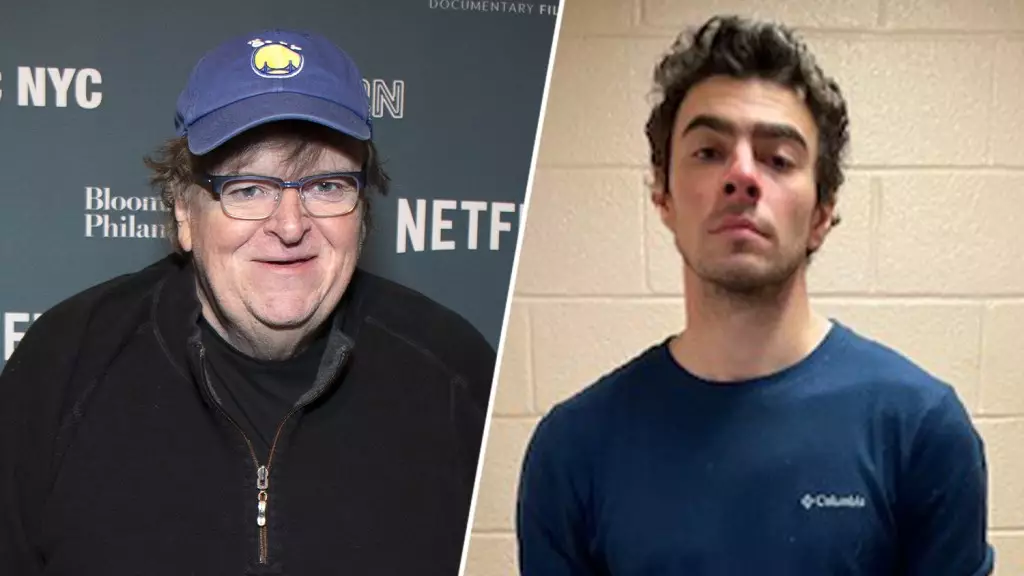The tragic assassination of Brian Thompson, the CEO of UnitedHealthcare, has sparked a cacophony of reactions from the public and media alike. The arrest of Luigi Mangione, the alleged perpetrator, has further intensified scrutiny over the healthcare system in the United States. Mangione’s manifesto, which reportedly references the acclaimed filmmaker Michael Moore, has become a focal point of criticism against an industry that has long been accused of prioritizing profits over patient well-being. While the killing of a corporate leader typically garners mixed reactions, the underlying complexities of the healthcare debate run deeper than the shocking act itself.
In an open letter, Michael Moore acknowledged the public’s outrage directed towards the healthcare sector following Thompson’s death. His declaration of support for the anger expressed against the industry underscores a pervasive sentiment that has been simmering beneath the surface for years. Moore stated emphatically, “I am not one of them,” referring to those who seek to downplay the anger. He perceives this frustration as wholly justified, a reflection of a broader crisis characterized by inadequate access to affordable healthcare, debilitating medical debt, and systemic failures that have left millions vulnerable.
Moore’s engagement with this issue is illuminating. He highlights that the disdain for the healthcare system is not merely a reaction to the killing of a CEO but rather a culmination of collective suffering inflicted by an industry that few can afford to trust. The filmmaker goes as far as to call out the systemic injustices faced by everyday Americans, emphasizing that it’s not the high-profile individuals who are often in jeopardy but rather the everyday citizens who suffer silently amid a complex network of insurance-related failures.
Moore’s delineation of “RICH ON RICH crime” speaks volumes about the economic divides that shape our society. His commentary reflects an understanding that violence in the realm of corporate leadership, while tragic, often distracts from more significant issues that plague the average American: inaccessible healthcare and rampant economic inequality. This situation breeds a culture of despair, where citizens are forced to confront a stark reality—some lives are valued more than others based on wealth and privilege.
It’s critical to recognize that this tragic event is not an isolated incident but rather a symptom of a larger, systemic problem within the American healthcare framework. The fact that the very foundation of healthcare often hinges on profit margins rather than patient outcomes creates an environment rife with frustration and despair. This sentiment connects back to Moore’s assertions—that the anger towards insurance giants is not only understandable but necessary to confront the inefficiencies that lead to unnecessary pain and suffering.
Moore points out that the lack of substantive governmental action has allowed the healthcare industry to spiral out of control. For years, insurance companies have enjoyed lucrative profits while tens of millions of Americans remain underinsured or entirely uninsured. The call for media coverage to focus not solely on the sensational aspects of violence but also on the systemic abuse endured by patients is pivotal. As media narratives often focus on these tragic events, they risk overshadowing the essential conversations about healthcare reform and the urgent need for compassionate, equitable care.
In sharing a link to his documentary “Sicko,” Moore invites the public to engage in a deeper exploration of healthcare issues, arming them with knowledge to demand justice and reform. This act serves as both a cathartic release of pent-up rage and an avenue for education and advocacy.
The tragic events surrounding Brian Thompson’s death serve as a potent reminder of the healthcare crisis afflicting the nation. The dialogue ignited by this tragedy must extend beyond sensationalism to a thorough examination of the healthcare system and the injustices it perpetuates. Moore’s call to action embraces the need for widespread anger and awareness as vital components in the pursuit of meaningful reform.
Ultimately, until the infrastructure of American healthcare evolves to prioritize human life over profit, tragedies like Thompson’s assassination will likely continue to serve as a grim testament to what happens when compassion is overshadowed by greed. Embracing this anger and channeling it into advocacy may serve as a catalyst for systematic change—one that ensures no one must face the dire consequences of being uninsured or underinsured in the wealthiest nation in the world.

